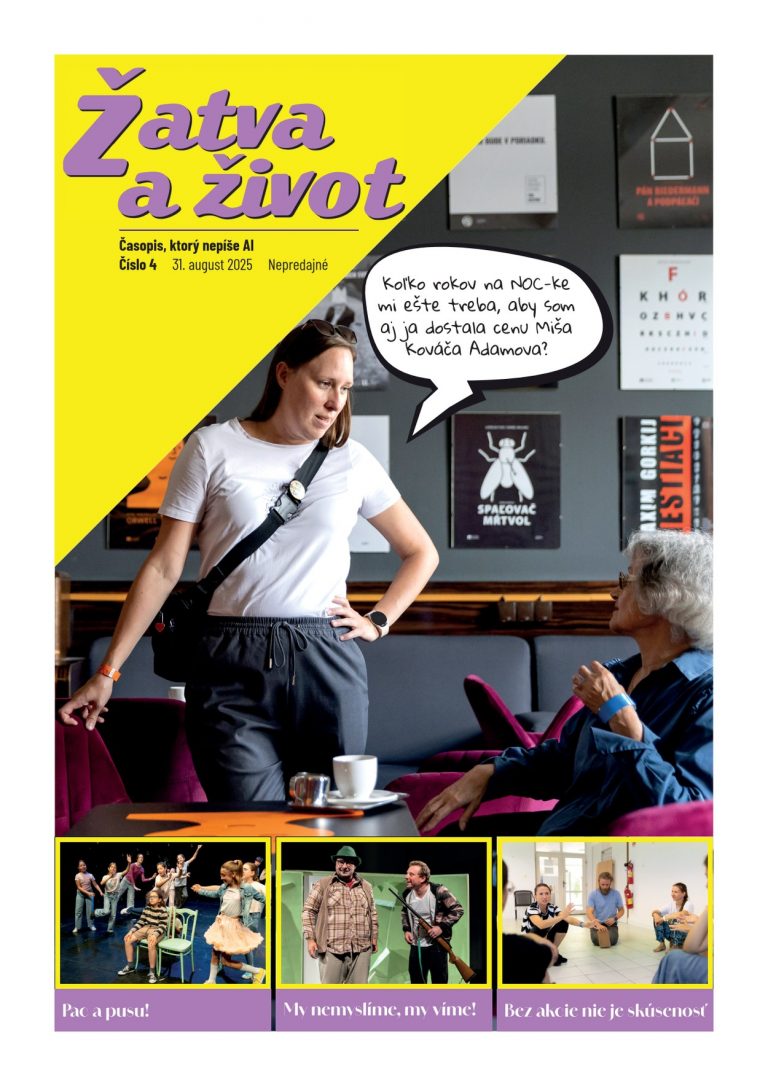

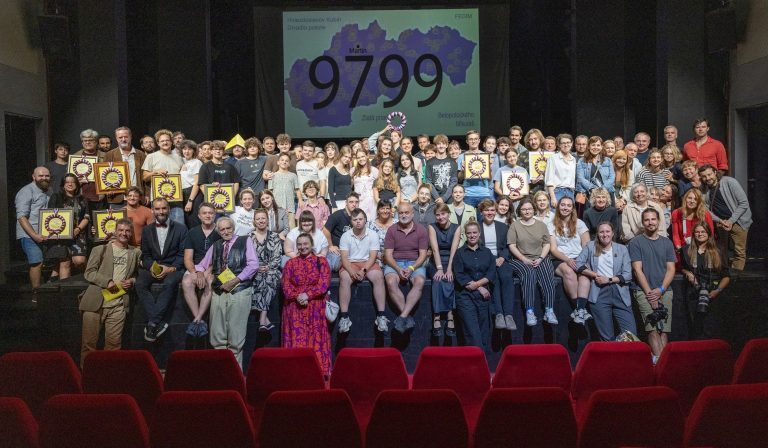
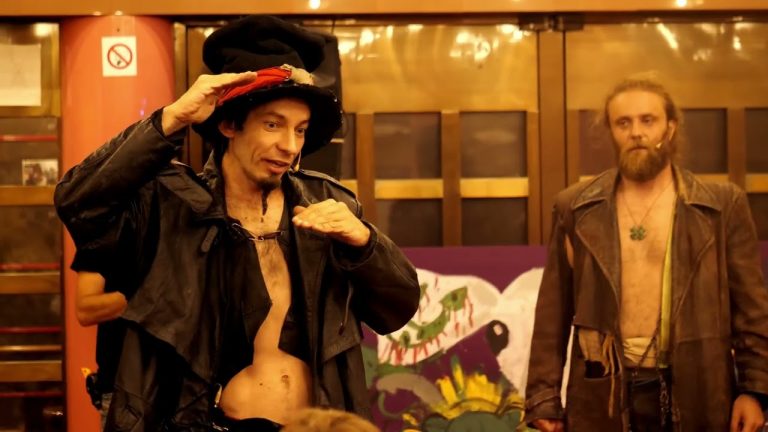
Južný vietor – Osem miliárd básní – Deloreskere Čhave – Filmový kvíz – Čím rýchlejšie kráčam, tým som menšia – KAROL – parazit-ty – Záveje
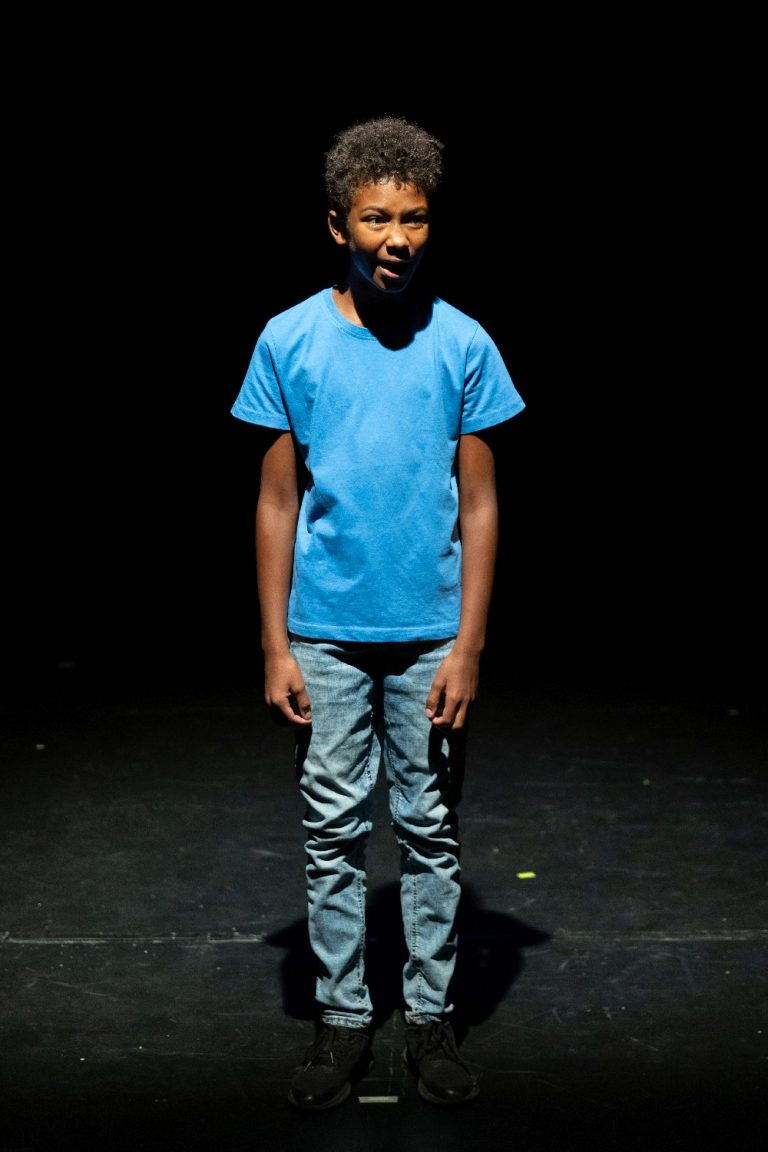
Umelecký prednes: Nikolas Vislocký, Stará Ľubovňa (Silvia Kaščáková – montáž z knihy Osem miliárd básní)
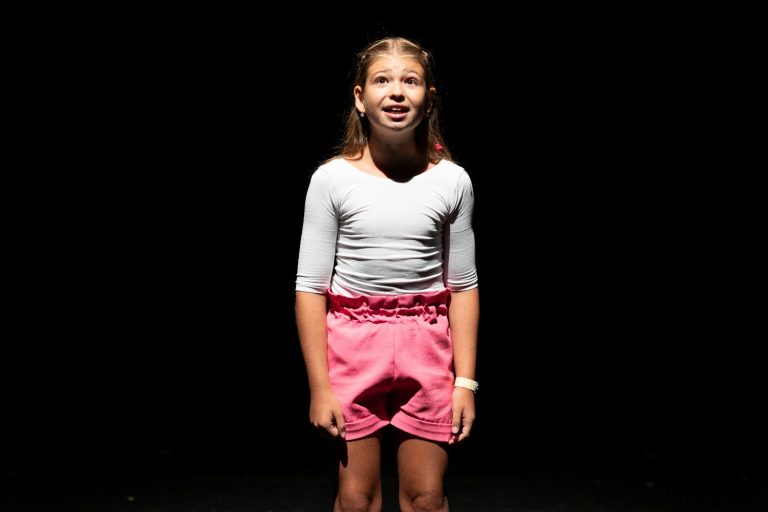
Umelecký prednes: Thalia Alexandra Král, Nitra (Vasko Popa, Viliam Klimáček – Jakubko a rebrík)
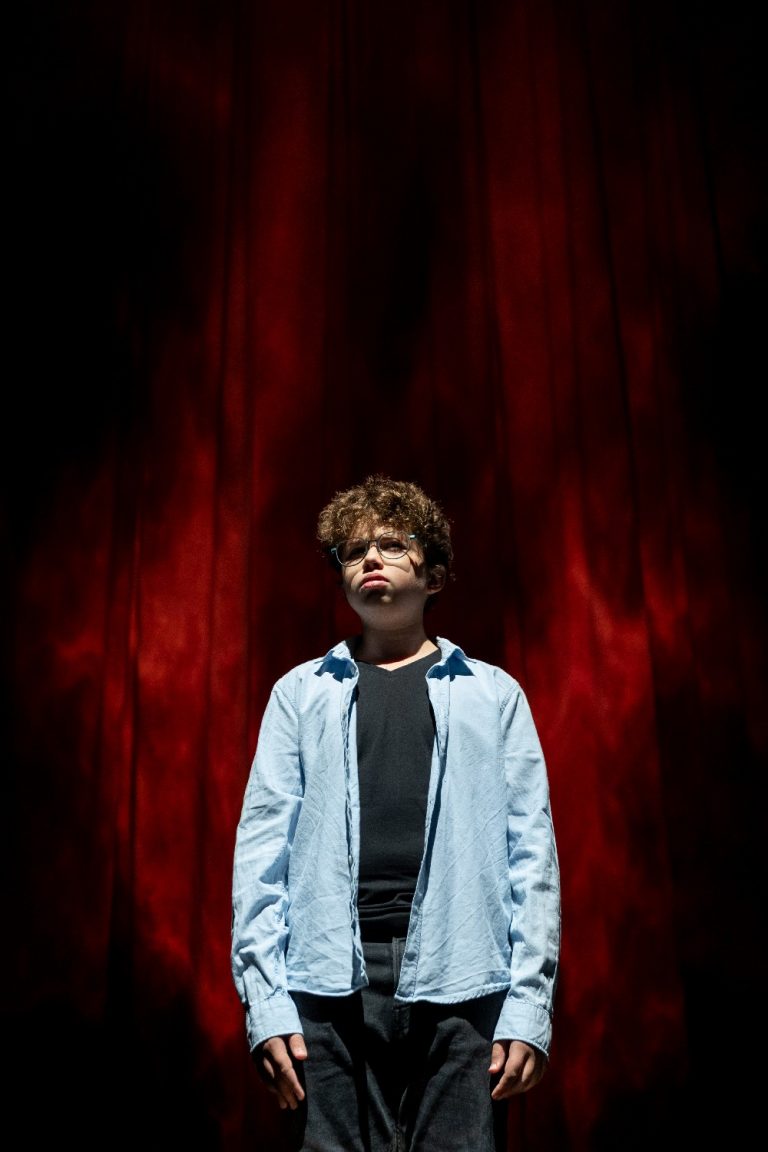
Umelecký prednes: Michal Nvota, Trnava (Miroslav Válek – Skľúčenosť)
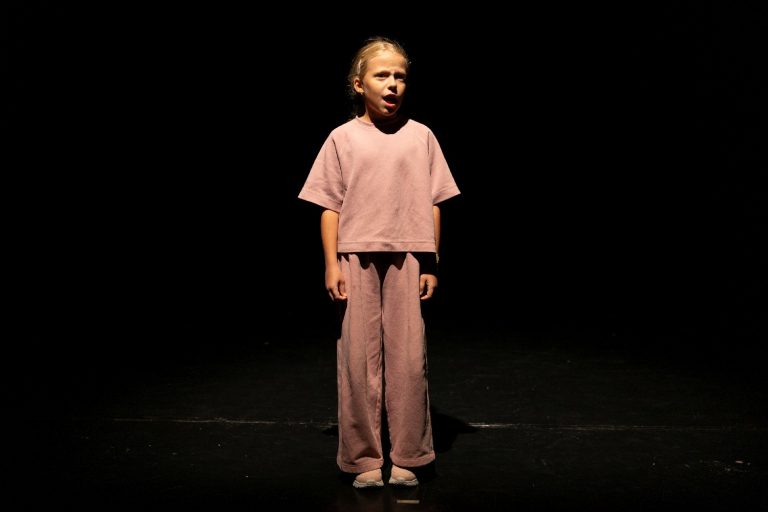
Umelecký prednes: Marianna Šmidáková, Nitra (René Goscinny – Čoskoro sa začne škola)
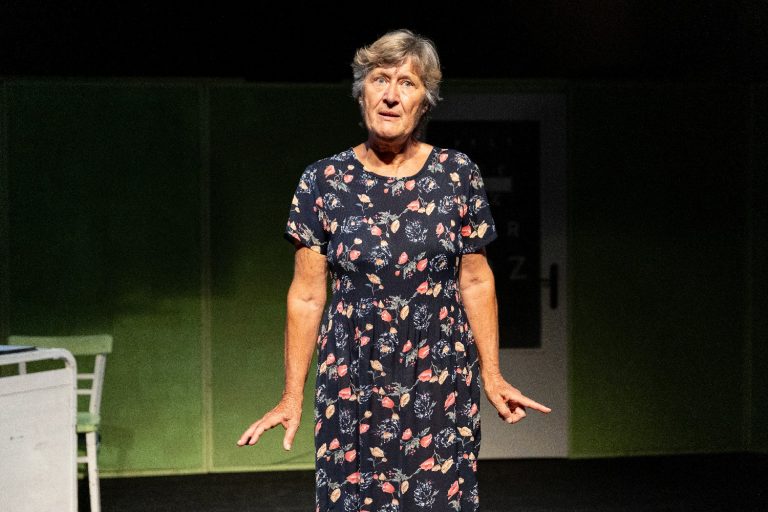
Umelecký prednes: Mária Mišunová, Nitra (Kjersti A. Skomsvold – Čím rýchlejšie kráčam, tým som menšia)
In preparation…
If you are interested in taking part in the programme of our festival, please contact the head of programme Matej Moško directly using email address ks.ak1769309567con@o1769309567ksom.1769309567jetam1769309567. Please attach the basic information, technical specifications along with some photos and preferably a link to the video of your perfomance.
The programme of the festival will be available in the middle of the July.
Scénická žatva (Scenic Harvest) stands as the paramount national festival with international participation and holds the distinction of being the oldest non-professional theatre festival in Europe. Its main programme showcases the winners from the annual multi-stage theatre competitions throughout Slovakia, complemented by selected winners from single-stage Slovak theatre festivals. The festival’s vibrant off-programme welcomes invited foreign performances from across the globe, alongside diverse multi-genre artistic performances from Slovakia. Each August, Martin becomes the meeting point for theatre non-professionals eager to witness the year’s finest productions, engage in the program, or expand their knowledge in the creative theatre workshops.
August 27th – August 30th 2025
Slovak Chamber theatre
Divadelná 651/1
036 80 Martin
Slovak Chamber theatre, Barmuseum, Turčianska knižnica
Festival ticket … 25 €
One show ticket … 5€
(3€ reduced fee for students and seniors)
Creative workshops ticket … 50€
Director of programme: Mgr. Art. Matej Moško, PhD. mks.ak1769309567con@o1769309567ksom.1769309567jeta1769309567
Contact for media: Mgr. art. Ľudovít Andrejo ks.ak1769309567con@o1769309567jerdn1769309567a.tiv1769309567odul1769309567
On the initiative of the secretary of Matica slovenská (Slovak Heritage Foundation), Dr. Štefan Krčméry, the Centre of Slovak Amateur Theatre (ÚSOD) was founded. As early as 1923, they organized the first national theatre competition in Martin. The last competition that still followed the tradition of the Centre of Slovak Amateur Theatre took place in June 1950 in Banská Bystrica.
In the 1950s, based on the decision of the state cultural and educational care, as well as Matica slovenská, the Honorary Wreath of Winners award was discontinued, and only the institution of the absolute winner was introduced. In 1951, a competition of folk artistic creativity and a demonstration exhibition were announced, which took place in Trenčín. Curiously, only three theatre ensembles were included in the program. Theatre amateurs from all around Slovakia called for a return to the ÚSOD system. In 1953, state authorities decided that theatre plays would no longer be assigned directly by officials, but amateur actors were allowed to choose from 200 permitted ones.
The first year of the Martin Theatre Festival in 1967 was organized by Matica slovenská. It followed the activities of ÚSOD and the tradition of theatre competitions. In 1970, the festival of drama acting merged with the Martin Puppet Festival, and the joint event was named Scénická žatva (Scenic Harvest). Until 1976, it was organized by Matica slovenská.
The emergence and the initial years of Scénická žatva were met with great enthusiasm. The quality of productions increased, and healthy competition arose. High-quality analyses of productions and expert juries also contributed to the theatrical movement. The interest of the audience in non-professional theatre increased. The tradition of a „festival of festivals“ was established, where all types and genres of amateur theatre were presented. The non-professional theatre movement attracted new and more ambitious lecturers and jurors. Through their evaluations and comments, they shaped the directors of ensembles and the protagonists of productions – the actors.
Scénická žatva became a launching pad for Slovak amateur actors to European and world theatre festivals. The Educational Institute joined the International Amateur Theatre Association AITA/IATA (since 1969) and managed to invite a number of foreign observers to the festival in Martin. Many of them were surprised by the high organizational level of the festival, as well as the quality of the performed productions. Thanks to this, invitations to international theatre festivals abroad followed.
In 1976, the Ministry of Culture entrusted the organization of Scénická žatva to the Educational Institute, and in that year, for the first time, the Prize for Creative Act of the Year was awarded.
After 1982, a period of significant organizational problems began. The Ministry of Culture, as the announcer of the competition, changed the periodicity of the multi-stage competitions, whose winners were about to form the programme of Scénická žatva, to biennial. Thus, the organizers could not apply the previously valid rule that the winners of individual categories and selected thematic theatre competitions could advance to Scénická žatva in Martin in the current year. A period of improvisation began, during which the organizers of Scénická žatva tried to maintain the highest possible professional and organizational level.
Since 2004, the date of the festival was changed to the last week of August. Its home stage is the Slovak Chamber Theatre in Martin. Within the European network of amateur theatre festivals AITA/IATA, the festival had great credit and was ranked among the four best amateur theatre festivals in Europe in terms of event organization, but especially the quality of the presented productions. This recognition is the legacy of several generations of professional workers and methodologists of amateur theatre who began and maintained the tradition of progressive (multi-stage) competitions in non-professional theatre and artistic recitation.
The year 2004 was one of the breakthrough years for the Scénická žatva festival, because in that year, the training of amateur theatre creators was renewed at the festival – creative theatre workshops focused on various areas of creation, production, and management of amateur theatre. Previously, the summer theatre school was carried out as a separate activity of the National Education Centre (NOC). By moving the date of Scénická žatva from October to August, the possibility of holding the summer theatre school directly at Scénická žatva opened up.
Since 2011, the programme council has definitively discontinued the participation of winners of the so-called thematic festivals (Festival of Anička Jurkovičová, Theatre Trebišov, Palárikova Raková, PAN, etc.). The reason was the varying quality of the winners of these single-stage competitions. The emphasis shifted to the quality of productions of ensembles participating in the multi-stage competitions that were run and guaranteed by NOC. In order to reshape the broken connections between different amateur festivals in Slovakia, this was later reconsidered in 2022. Strict rules were introduced for the single-stage festivals to be able to suggest their winner for participation in the programme of the Scénická žatva festival. The Scénická žatva festival still maintains contact with foreign theatre, both by importing interesting foreign productions into the Scénická žatva programme (approximately 3 productions) and by exporting inspiring productions of Slovak theatre ensembles to the most important festivals abroad. Participation of a theatre ensemble in the Scénická žatva programme is a victory for the ensemble, but also an opportunity to travel to a foreign festival, as observers from abroad and organizers of theatre festivals abroad regularly participate in Scénická žatva.
In the years 2004–2014, the Jozef Kroner Society awarded the Jozef Kroner Prize to the best professional and amateur actors, and most of its ceremonial events were part of Scénická žatva. Since 1976 until 2016, the Prize for Creative Act of the Year was awarded at Scénická žatva as the most significant recognition of creation in amateur theatre in Slovakia. This tradition was discontinued because of the change of focus from the competition to the gathering of the best Slovak amateur ensembles. In 2022, during the 100th anniversary of the theatre competitions in Slovakia, a new system of awards was introduced. Instead of choosing only one best performance, Scénická veniec (The Scenic Wreath) is awarded to individuals for their role in the process of creation of the performances (the best director, the best set designer, the best actor, the best actress, etc.). The award for the best performance is deliberately not being awarded.
At the end of August 2017, theatre artists from all over the world gathered in Monaco for the 16th World Theatre Festival and the 33rd AITA/IATA Congress. For the first time, on the occasion of two major anniversaries – the 60th anniversary of the World Festival of Amateur Theatre (1957), which takes place every four years, and the 65th anniversary of the founding of the non-governmental International Amateur Theatre Association AITA/IATA (1952) – representatives of AITA/IATA recognized several theatre artists as well as international theatre festivals. Scénická žatva, which has been organized by the National Education Centre for 43 years, received a significant award as one of the seven best festivals from around the world. The award was accepted by Jozef Krasula, President of the Slovak Centre of AITA/IATA.
Používame súbory cookies aby sme pre Vás zabezpečili ten najlepší zážitok z našich webových stránok aj pri ich opakovanej návšteve. Kliknutím na tlačidlo “Prijať” nám udelíte Váš súhlas s použitím všetkých súborov cookies. Detailne môžete použitie súborov cookies nastaviť kliknutím na tlačidlo "Nastavenie cookies". Nesúhlas alebo odvolanie súhlasu môže nepriaznivo ovplyvniť určité vlastnosti a funkcie.